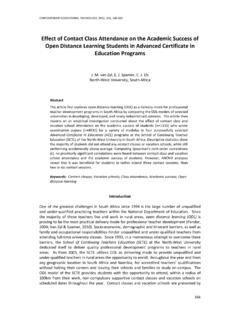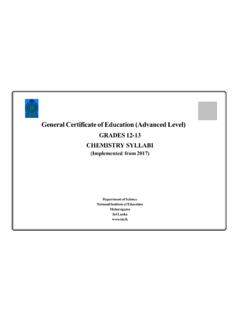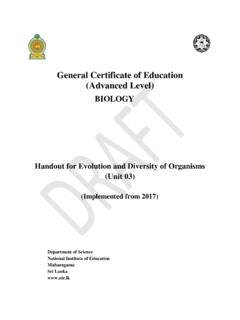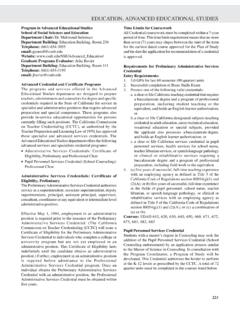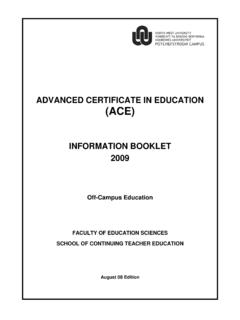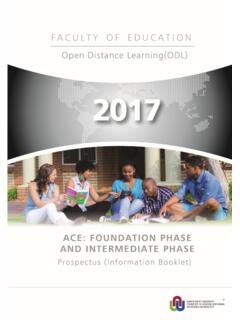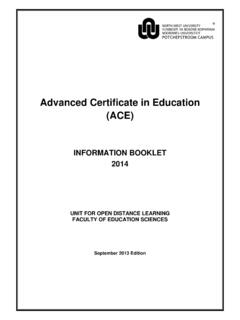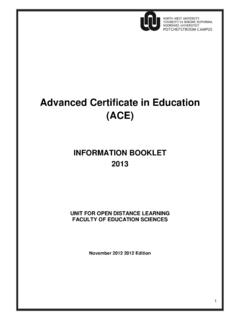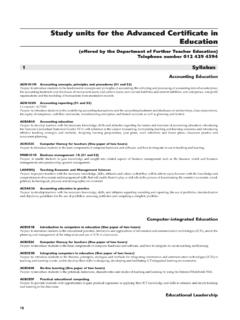Transcription of Advanced certificates - School of Education
1 1 Advanced certificates Programme Leader: Associate Professor R F Sieb rger Advanced certificates in Education (ACE) (120-130 NQF credits) The Advanced certificate in Education is a one-year qualification usually offered part-time over a two-year period. ACEs are offered in either Adult Education or Continuing Professional Teacher Development. Minimum requirements for readmission: 1. Except by permission of the Senate, a part-time student shall not be permitted to renew his/her registration in the Faculty unless he/she has passed: (a) by the end of the second year of registration, two semester courses or equivalent qualifying for the certificate ; (b) by the end of the third year of registration, six semester courses or equivalent qualifying for the certificate . 2. Except by permission of the Senate, a full-time student shall not be permitted to renew his/her registration in the Faculty unless he/she has passed by the end of the first year of registration two semester courses or equivalent qualifying for the certificate .
2 3. A candidate who fails to pass a course after two years of study will be excluded from further registration for such a course. Award of the certificate : (a) A candidate must pass each course within his/her curriculum to be awarded the certificate . (b) The certificate may be awarded with distinction where (i) an overall average result of at least 75% is obtained AND (ii) a minimum grade of 65% in each course of the certificate is obtained. 1. Adult Education ACE in Adult Education (Formerly Advanced Diploma for Educators of Adults) (Not offered in 2014) Convener: Dr S Ismail. Introduction: This specialisation is not offered by correspondence. Participants need to be resident in the Cape Town area and able to attend all the classes. The scope of Adult Education : The range of work done by educators of adults is very wide. It includes development projects, workplace training, teaching in tertiary institutions, adult basic Education and training (including literacy), teaching at adult Education centres, art colleges, human resource development, health Education , religious Education , further Education and training colleges, and educational programmes based in libraries and museums.
3 An adult educator is any person with a responsibility for helping adults to learn, whether in formal or non-formal situations. General aims of the course: The course aims: (1) to develop a theoretical grasp of educational practice. This includes the purposes and contexts of adult Education , particularly in a South African setting; 2 (2) to develop knowledge and skills that will enable students to enhance their own learning and their practice in adult Education ; (3) to provide the opportunity for students to build a curriculum most suited to their needs and interests. Admission requirements: A candidate is required to be: (a) A graduate of this University or of another university recognised by Senate; OR (b) A person who holds a full-time, three-year post-Matriculation qualification approved by Senate for the purpose; OR (c) A graduate of the Diploma in Education of this University; OR (d) A person who by means of such assessment as may be prescribed by the Faculty Board satisfies Senate that he or she has attained a level of competence which, in Senate's opinion, is adequate for admission to the programme.
4 Times of classes: Classes will be held on Wednesdays during University terms from 15h00-18h00, or at any other time determined by the Department. Additional Saturday workshops may be required, but no more than 3 per year. Compulsory (core) courses: First year NQF credits HEQSF level (a) EDN3000F Adult Learning and Teaching 24 6 (b) EDN3001S Professional and Policy Studies 24 6 Second year (a) EDN4184F Adult Education and Development (Not offered in 2014) 24 6 (b) EDN4185F Adult Education and the Workplace (Not offered in 2014) 24 6 OR EDN4186F Literacy and Adult Basic Education (Not offered in 2014) 24 6 OR EDN4002S Adult Education and Social Transformation (Not offered in 2014) 24 6 (c) EDN4120W Evaluation Research Projects (Not offered in 2014) 24 6 3 The two-year programme: Year 1 aims to enable students to grasp the discourses and practices that have shaped processes of adult learning, which in turn have structured the broad field of adult Education .
5 It will provide students with theoretical frameworks with which to view adult Education practices to enable them to describe, analyse, assess and redesign these practices (where appropriate). A further aim is to enable students to increase their specialised roles in Education , training and development, through building a broader repertoire of professional skills for work in the changing context provided by new policy frameworks. Year 2 starts with a focus on theories which attempt to explain shifts in the organisation of learning and society, followed by contextual study in a site of practice with some degree of specialisation according to choice. The second semester provides a focus on research, with an introduction to evaluative research, followed by project-based research work which returns to aspects of professional practice. 2. Continuing Professional Teacher Development These ACE specialisations are offered in response to demand by the Western Cape and/or national Departments of Education only.
6 Please note that this means that applicants must normally be selected by the Western Cape Education Department (but may apply individually) in order to register for them and that they are not offered when there is no demand for them. Admission: The specialisations are intended for in-service primary and secondary School teachers who hold an M+3 qualification. They are intended to upgrade their subject teaching and professional competence. Except in the case of the ACE ( Education Management and Leadership Development [ School Leadership]), a person shall not be admitted as a candidate for the certificate unless he/she has: (a) an approved three-year Teacher's certificate or Diploma in the phase for which the ACE is offered (for General Education and Training), or the subject for which the ACE is offered, where appropriate (for Further Education and Training); AND (b) at least three years approved teaching experience.
7 ACE in Education Management and Leadership Development Convener: J D Gilmour This specialisation is a professional programme based on a national curriculum developed by the Directorate: Education Management and Governance Development (EMGD) in the Department of Basic Education and is intended for practicing and aspirant principals. It is a workplace based specialisation. This impacts on the mode of delivery, the assessment methodology, and the degree of site-based assessment and support which is offered. Broadly, the specialisation aims to: empower/enable aspirant and practicing principals to develop the skills, knowledge, and values needed to lead and manage schools effectively and contribute to improving the delivery of Education across the School system, provide current principals with a formal professional qualification which is career related and, provide an entry criterion to principalship. The specialisation further aims to achieve the following: provide leadership and management to enable the School to give every learner quality Education through professional leadership and management of the curriculum and resources, 4 strengthen and support the role of principalship and develop principals who are able to critically engage and be self-reflective practitioners, and enable principals to manage their schools as learning organisations and to instil values supporting transformation in the South African context.
8 Criteria for admission are as follows: (a) Priority is given to practicing principals identified by provincial departments of Education or other agreed methods. (b) Candidates must have a formal professional teacher qualification at REQV level 14. In the case of candidates who are School principals, a formal professional teacher qualification at REQV level 13 is acceptable. (c) Have at least 3 years teaching experience. (d) Be employed at Post Level 2 and upwards. (e) Female educators will be given preference to address the gender equity profile in School management in the Education system. (f) Post Level 1 educators performing management tasks at P1 and P2 schools, will be considered. Their applications should be supported by a written statement, endorsed by the principal, School governing body or district official. (g) The principal and/or School governing body should endorse all applications. Where this may not be possible candidates have the right to appeal to the appropriate/relevant accounting officer in the system.
9 Compulsory (core) courses: NQF credits HEQSF level EDN4161W Basic Computer Literacy 4 6 EDN4162W Effective Language Skills 6 6 EDN4160W School Management and Leadership in the South African Context 10 6 EDN4164W Management Portfolio 10 6 EDN4165W Leading and Managing People in Schools (Not offered in 2014) 20 6 EDN4166W Organizational Systems, Physical and Financial Resource Management for Schools (Not offered in 2014) 20 6 EDN4167W Policy, Planning and Governance 20 6 EDN4168W Managing Teaching and Learning 20 6 Two electives courses chosen from the list below: EDN4163W Outcomes-Based Assessment (Not offered in 2014) 10 6 EDN4169W Moderation of Assessment in Schools (Not offered in 2014) 10 6 EDN4170W Management of Subject Areas/Learning Areas/Phases 10 6 EDN4171W Mentoring for School Managers (Not offered in 2014) 10 6 ACE in Literacy, Numeracy and Curriculum Leadership Foundation Phase Convener: C K hne Compulsory (core) courses: NQF credits HEQSF level EDN4172H Foundation Phase Curriculum Leadership A 12 6 EDN4173H Foundation Phase Curriculum Leadership B 12 6 EDN4174W Learning in the Foundation Phase 24 6 EDN4175W Teaching in the Foundation Phase 24 6 EDN4176W Foundation Phase Numeracy 24 6 EDN4177W Foundation Phase Literacy 24 6 5 ACE in Language, Mathematics and Curriculum Leadership Intermediate Phase Convener: K Hassan Compulsory (core) courses: NQF credits HEQSF level EDN4178H Intermediate Phase Curriculum Leadership A 12 6 EDN4179H Intermediate Phase Curriculum Leadership B 12 6 EDN4180W Learning in the Intermediate Phase 24 6 EDN4181W Teaching in the Intermediate Phase 24 6 EDN4182W Intermediate Phase Mathematics 24 6 EDN4183W Intermediate Phase Language 24 6 ACE in Mathematics Conveners: G Powell and Y Johnson.
10 Compulsory (core) courses: At the GET level: EDN4004H GET Mathematics Curriculum A 12 6 AND EDN4005H GET Mathematics Curriculum B 12 6 OR EDN4103W Science and Mathematics in the New Curriculum 24 6 EDN4124W GET Mathematics: Number 24 6 EDN4125W GET Mathematics: Algebra 24 6 EDN4127W GET Mathematics: Shape & Measurement 24 6 EDN4128W GET Mathematics: Data Handling 24 6 At the FET level: EDN4006H FET Mathematics Curriculum A 12 6 EDN4007H FET Mathematics Curriculum B 12 6 EDN4149W FET Mathematics: Number 24 6 EDN4150W FET Mathematics: Algebra 24 6 EDN4151W FET Mathematics: Shape & Measurement 24 6 EDN4152W FET Mathematics: Data Handling 24 6 ACE in Science Convener: N Mgoqi Additional admission criteria for the Advanced certificate in Education (Science): (a) At the GET level: science qualifications at 3rd year college level, or experience of teaching science at GET level; (b) At the FET level: a pass in Physical Science at grade 12 level or experience of teaching Physical Science at FET level.

